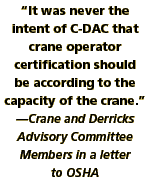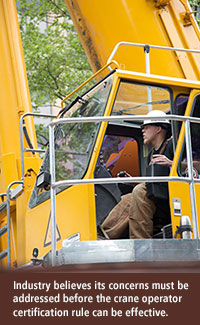Final Rule to Postpone Operator Certification Expected by Mid-Year
May 2014—The industry sent OSHA a clear and unequivocal two-part message last month: Postpone the crane operator certification requirements, and change the crane rule to reflect industry’s intent on the role that certification should play in an employer’s qualification process.
 The response to OSHA’s request for comments on its proposal to extend the deadline for operator certification by three years to November 2017 was overwhelmingly positive, and a further validation of prevailing industry opinion that OSHA’s understanding of C-DAC’s original intent with respect to crane operator certification is flawed.
The response to OSHA’s request for comments on its proposal to extend the deadline for operator certification by three years to November 2017 was overwhelmingly positive, and a further validation of prevailing industry opinion that OSHA’s understanding of C-DAC’s original intent with respect to crane operator certification is flawed.
Among the more than 40 letters of support received by OSHA before the March 12 deadline were no less than 10 from national and key regional industry associations (see sidebar) representing tens of thousands of employers from all facets of the U.S. construction industry, both union and open shop, labor and management. Contractors, steel erectors, crane rental, utilities, crane distributors and the insurance industry were all represented. A public hearing is scheduled for May 19.
Perhaps most significant of all was a letter signed by 16 members of the Cranes and Derricks Committee (C-DAC) that should finally put to rest any doubts as to what they meant when they wrote the rule in 2003. “It was never the intent of C-DAC that crane operator certification should be according to the capacity of the crane,” the letter states, “nor . . . to imply that crane operator certification was equal to qualification.” Additionally, five C-DAC members wrote individual letters of support.
 The following leading industry associations filed letters with OSHA in support of an extension of the crane operator certification requirement.
The following leading industry associations filed letters with OSHA in support of an extension of the crane operator certification requirement.
- National Association of Home Builders
- Associated Builders & Contractors
- National Propane Gas Association
- Specialized Carriers & Rigging Association
- International Union of Operating Engineers
- Associated General Contractors of America
- American Road & Transportation Builders Association
- Associated Equipment Distributors
- American Subcontractors Association
- Allied Building Metal Industries (New York)
- Crane Owners Association (California)
- National Rural Electric Cooperative Association
Many, including the C-DAC members, regretted the delay, but recognized it was necessary to give OSHA time to address industry’s concerns. “We urge OSHA to act with all speed to resolve this issue,” C-DAC members stated.
Given that nationally accredited crane operator certification has been proven to save lives (Cal-OSHA crane study, 2008) some industry observers have pointed to the continued exposure to risk that such a delay might cause crane operators. But as leading insurance provider NationsBuilders Insurance Services (NBIS) commented, the “major areas of concern for the future safety of employees working around cranes...must be addressed before the regulation can effectively save lives.... Leaving the rule as written would take us back in time not forward.”
For those states with their own requirements (see separate story) and employers who follow best practices, the federal OSHA delay is moot. “Every one of the 170,000 CCO certifications we have issued in the past 19 years has been without a federal requirement,” said Graham Brent, Executive Director, National Commission for the Certification of Crane Operators (NCCCO). “For employers and crane operators who have seen the inherent value in professionally developed, ANSI-accredited certification, OSHA’s postponement is, in practice, largely irrelevant.”
Employers will still have to ensure their operators are trained and qualified during the three-year postponement, OSHA has emphasized.
For Many States, It’s Business As Usual
While attention has been focused on federal OSHA’s proposal to delay the implementation of a national crane operator certification requirement, many employers continue to seek and maintain certification for their operators as some have done for almost two decades since CCO certification became available. Some are driven by a desire to follow best practices, others by project owners’ requirements. Still others work in states that have their own licensing or mandatory certification. Among the 17 states and six cities that maintain their own requirements, several (including California, Washington, and Philadelphia) have set standards considerably higher than the federal proposal.
States
- California
- Connecticut
- Hawaii
- Maryland
- Massachusetts
- Montana
- Minnesota
- Nevada
- New Jersey
- New Mexico
- New York
- Oregon
- Pennsylvania
- Rhode Island
- Utah
- Washington
- West Virginia
Cities
- Chicago
- District of Columbia
- New Orleans
- New York City
- Omaha
- Philadelphia
Visit NCCCO's OSHA Rule Reopening Resources Center.